Raising Ducks or chickens? Which is better for you? I recently had a friend bring home ducklings. It was their first experience with any livestock as a pet.
I wish I could have told them a few things that I’m going to tell you if you are wondering if you should start with ducks or chickens.
Both are pretty cute, but ducks are more work upfront. If you don’t want to read all the little details, my short answer is to go with chicks for your first homestead choice.
This is our fourth batch of ducks, and every time I get them again, I say, why did I agree to ducks? We did get this batch on clearance ( AGAIN) at Tractor Supply for $2.50 this year in 2023.
The price of ducks went up a couple of dollars. This year they are $7 a duck, and in our state, you must buy a minimum of six. Last year ducks were $5 each.

Before you think I don’t like ducks, that’s not it. I love all of my farm animals, and I love having ducks, but from a beginner’s standpoint, they are the choice that involves more work.
Since our ducks were on clearance and only nine left, they gave us the last three. It was a mixed breed at the time of purchase, and my daughters were begging for ducks. So nine ducks came home with us, and now I’m feeding and cleaning them.
The reason, they said, is they aren’t as cute as they were hoping. Yep, the ducks stayed a beautiful golden yellow and turned out to be Pekin.
We have processed our ducks before but never this breed. I’ll try to do a video when we process these birds, like our meat bird video.
The first thing you need to consider is the purpose of your ducks or chicks. Are you bringing home to provide eggs? Maybe you’ve always wanted ducks? Or you want to start backyard chicken keeping but wonder if ducks may be easier?
Maybe your kids talked you into getting one or the other, and you aren’t sure which? Let’s look at some pros and cons of keeping both ducks and chickens.
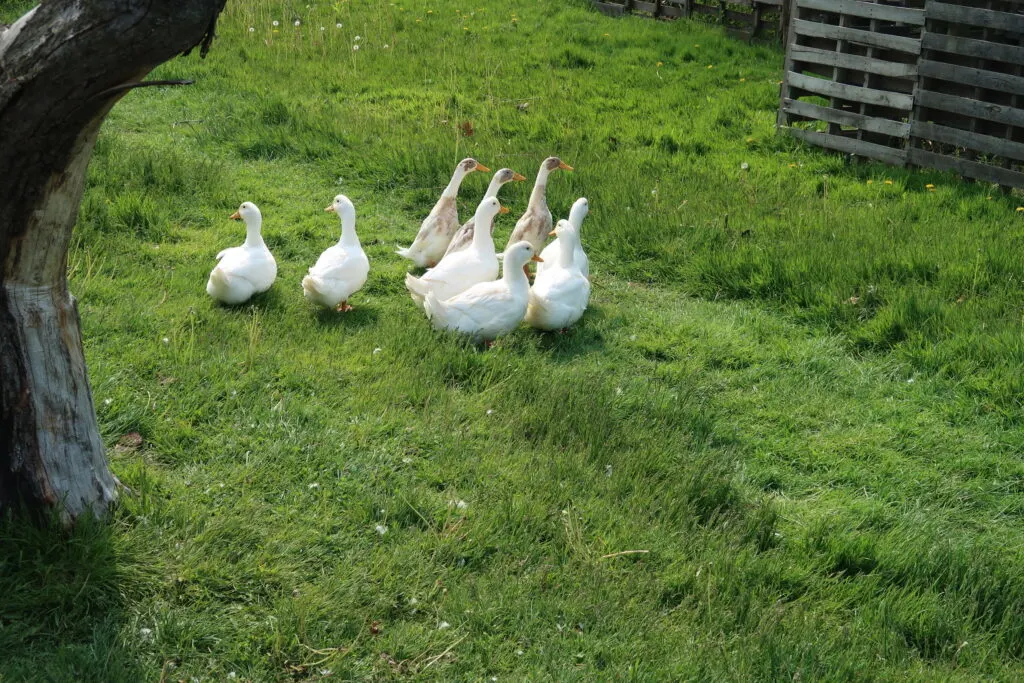
Duck Houses & Chicken Coops
Ducks and chickens may look similar, but they can differ regarding housing, feeding, and breeding. Ducks generally require more space as they need an area for swimming, grazing, or roaming.
They are messier than chickens in every aspect. They make a mess when eating, and if you keep ducks and chickens together and have the chicken feeder hanging, they are strong enough to knock it apart repeatedly.
This is how our chicken feeder constantly looks now. It’s fine. Everything is fine. 🙂
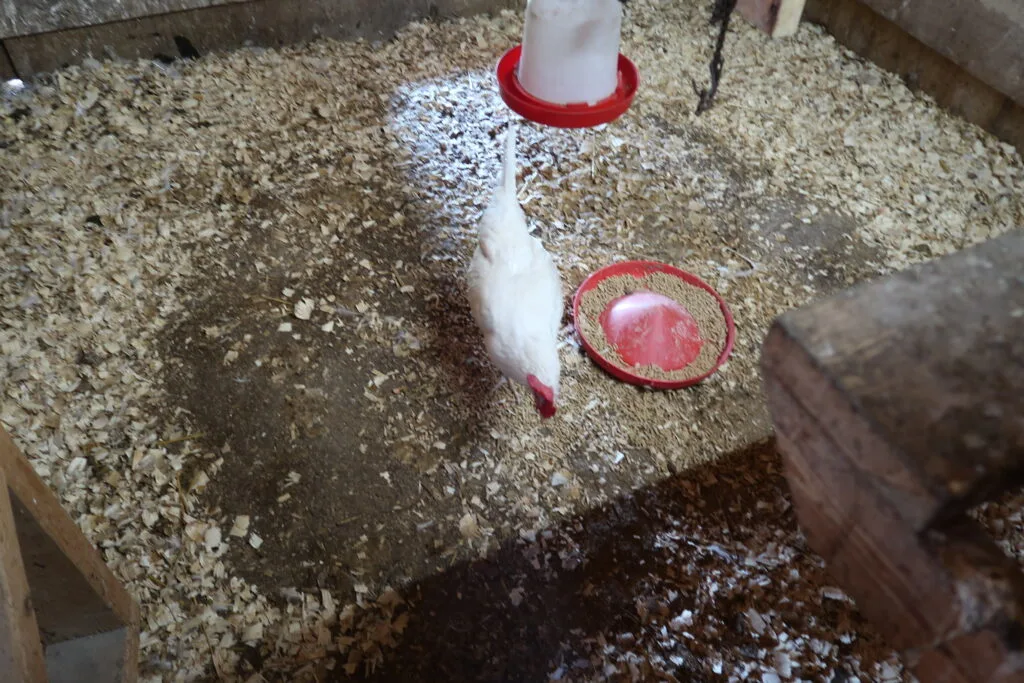
Ducks also need water when eating and tend to splash the water all over. Chickens are tidier when it comes to eating and drinking.
I recently saw a new duck waterer at Tractor Supply, and if I only had ducks, I would invest in it. The way it’s cupped looks like it won’t splash as much on the ground.
Chickens also don’t need as much room. When raising chicks or ducklings, you will be cleaning out the coop/pen a lot more with ducks vs. chickens.
This part alone is a reason I would choose chickens over ducks.

Confinement
Will they stay where you put them? Confinement is also an important factor to consider. Ducks tend to stay within the boundaries of their pen, while chickens can be more adventurous and may need a larger area with fencing or other barriers to keep them in.
Our chickens will fly up and over their run. After pasture-raising chickens for 12 years, I want them to stay inside the goat pen.
I’m almost at that point to do whatever it takes to keep them more confined. The ducks, we don’t worry about flying up and over the fencing.
The only time the ducks didn’t stay in their area was when we had them in the pig pen with pallets. They would crawl through the holes all the time. Once they discovered the pond, there was no turning back.

Free Range/Predators
Regarding free-ranging, ducks are usually easier to contain than chickens. When we let our first couple batches of ducks free range, or for us pasture raise, they would NOT go back in their coop at night.
Then when they discovered our pond, they wouldn’t leave the pond. You would think they would have been safe back there, but we lost them all to predators when they stayed by the pond.
This batch of ducks we have now, we are keeping fenced in.
Regarding predators, ducks can be a bit more vulnerable than chickens. Ducks are not as adept at climbing and hiding from predators as chickens, so it’s important to have a secure environment for them. Also, they tend to sleep out in the open, making them easy targets for hawks or other birds of prey.

On the other hand, chickens are better at running and hiding from predators so they are usually less vulnerable.
Also, ducks will make holes if you are free-range or have them in a run with your chickens. They love to dig in the dirt, especially if there is water, and look for bugs.

This is about a month after having our ducks in this area, and above are some of the holes they have created. Chickens will make holes too, but they usually do this in dry areas for a dust bath. Below are some pictures of the holes the chickens have made in our yard.

Some are under the apple tree, which isn’t as bad; the one on the side, well, if you aren’t aware of it, could hurt you walking on by.

Either way, expect some holes in your yard/pen area when raising ducks or chickens.

Also, a pool this small for our nine ducks will be completely muddy and black in a couple of hours.
What They Eat
The diet of ducks and chickens can vary, but overall, it’s important to ensure their nutritional needs are met. They can eat the same basic Layer pellets you find at a farm store. We feed our ducks and chickens the same Layer of Pellets.
The ducks eat so much more than the chickens. This is another important thing to keep in mind. Right now, we have Pekin and Indiana Runners, and the Pekins eat so much feed. I do not allow them to have feed during the day constantly.
We are raising these Pekins for meat, and it’s our first experience with this breed. I’m guessing they eat like this because they are more of a meat bird, similar to our meat chickens.
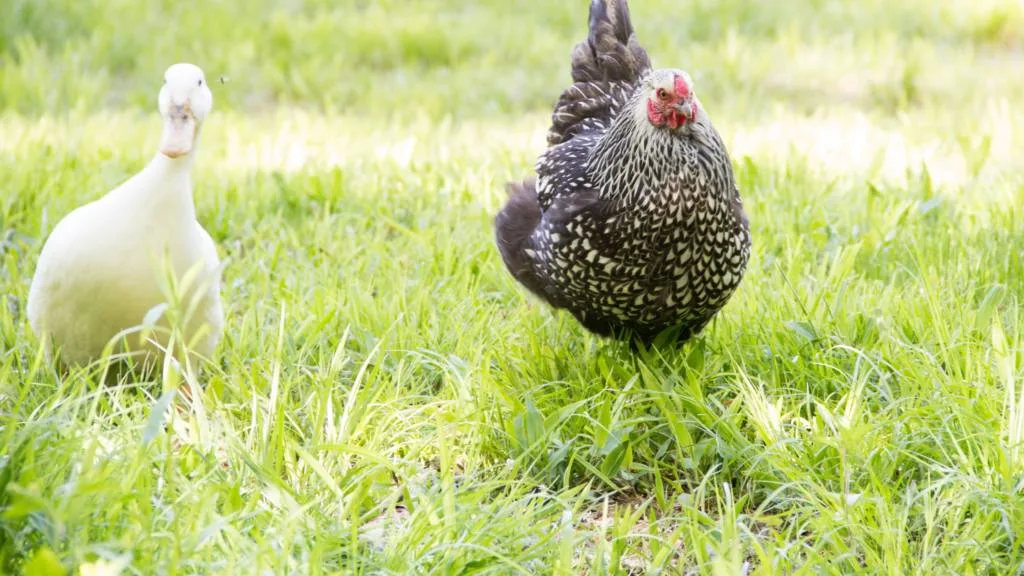
Keeping Ducks and Chickens: Tips for Maintenance and Management
Coop
Maintenance and management can be different for ducks and chickens. Ducks usually need more frequent cleaning of their housing as they tend to make a mess with their feathers, droppings, and eating. Chickens are generally easier to manage since they don’t require nearly as much cleanup.
Chickens will need nesting boxes in their coop, where we have yet to see a duck use one of the chicken’s nesting boxes. Our nesting boxes for the hens are currently up high so that the ducks won’t fly up there.
Finally, ducks are a bit harder to catch and handle than chickens. This is because they can be easily startled and fly away if not handled properly. Chickens can usually be caught quite easily and make great pets if handled with care.
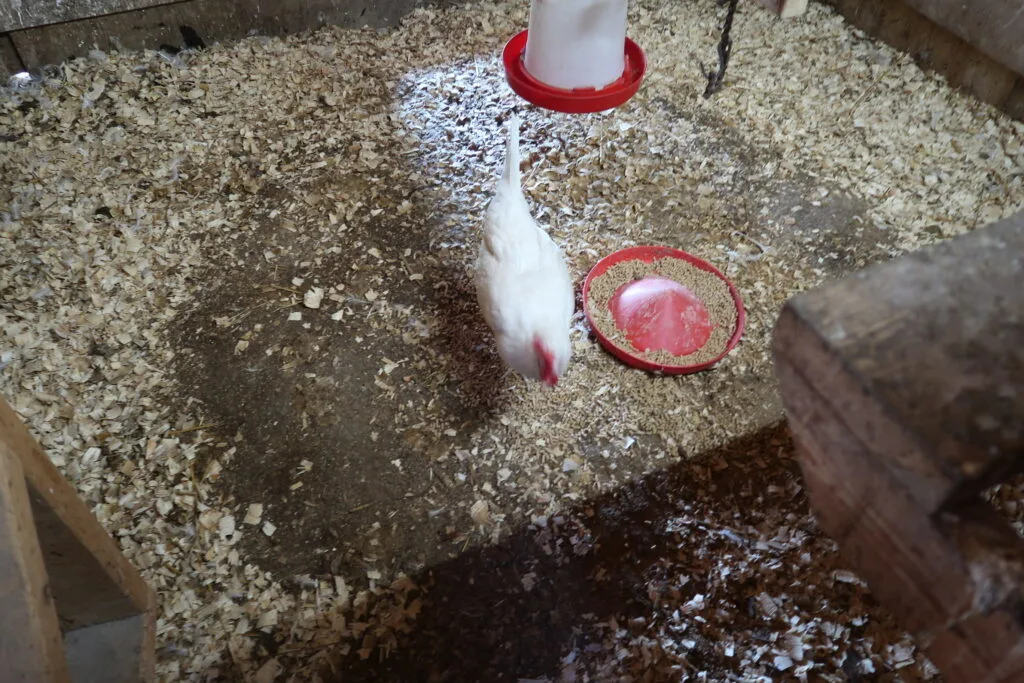
Bedding
I use sand in our chicken coop, but since the addition of our latest batch of ducks( before, we kept the ducks in with the pigs, but they kept escaping the pallet fence), I’ve had to add pine shavings.
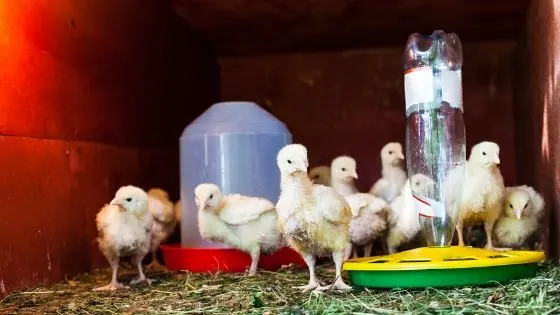
The amount of water and poop from nine ducks makes the sand a hard rock. The coop also needed a fresh batch of sand after winter, so that may be why, but until we process the ducks, I’ll add the pine shavings.
Chickens will need less frequent litter changes as they usually don’t require much cleanup. In conclusion, both chickens and ducks have pros and cons when it comes to housing, confinement, free-ranging, predator vulnerability and
Coop Training
When it comes to training, ducks are usually more difficult than chickens. Ducks can be flighty and easily spooked, so they may not always respond positively to any human interaction, depending on the breed.
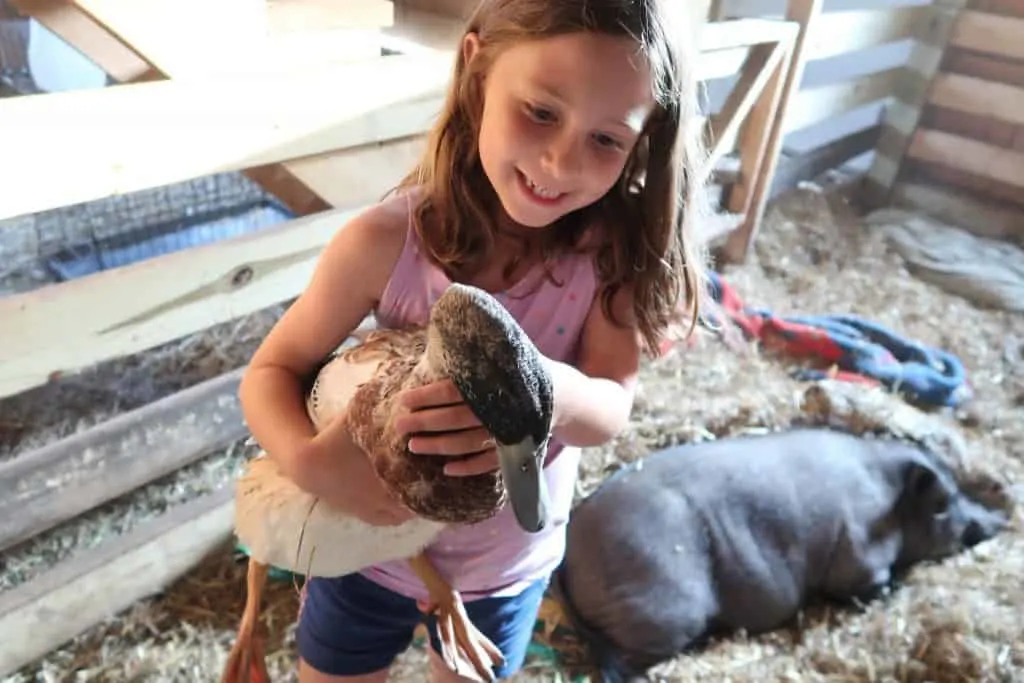
We had Rouen ducks, which have been my favorite breed so far. Beautiful and friendly. Our Kahki Campbells were okay, but so far, the Pekins are the timidest, and we held them frequently as ducklings.
Others have said the Pekins were the most friendly, so it could be the amount of time spent with them; I’m not sure. I’ll keep you all updated as time goes on.
The Pekins also are freaked out when I spray the hose in the air. Our last batch of Roen ducks used to love it, and it was so much fun to watch them play in the hose water.
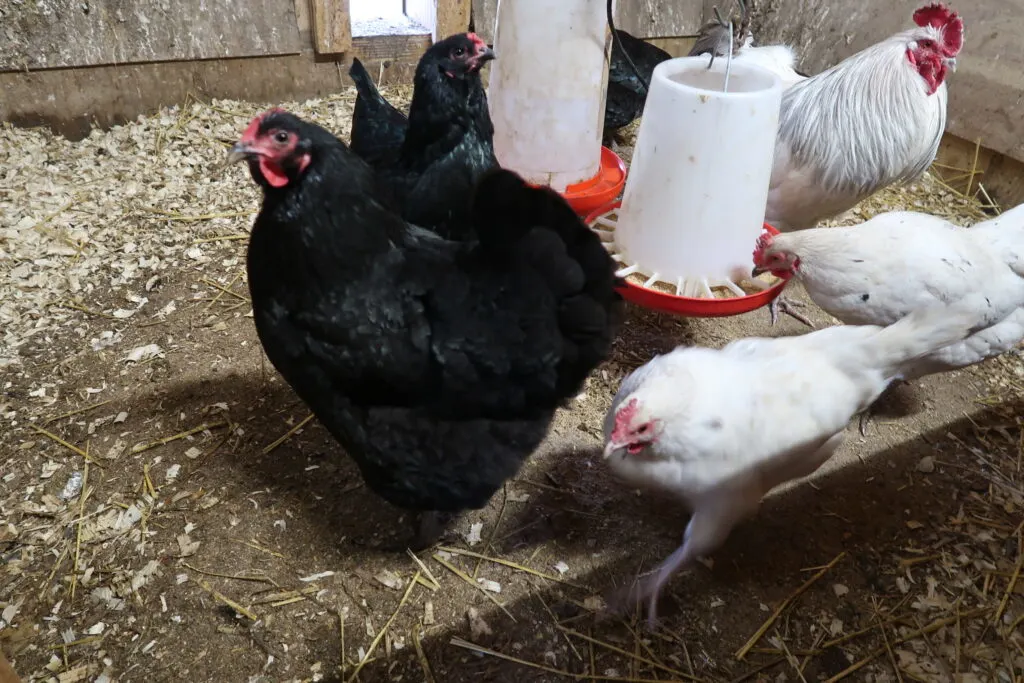
Noise
Ducks can be quite noisy more frequently than chickens. The noise ducks make is more like a constant chatter. Chickens, especially hens, can be quite loud and heard down the road.
If noise is a big concern, ducks are usually quieter. Of course, if you have a Rooster with your chicken flock, he can be quite noisy in the mornings and throughout the day.
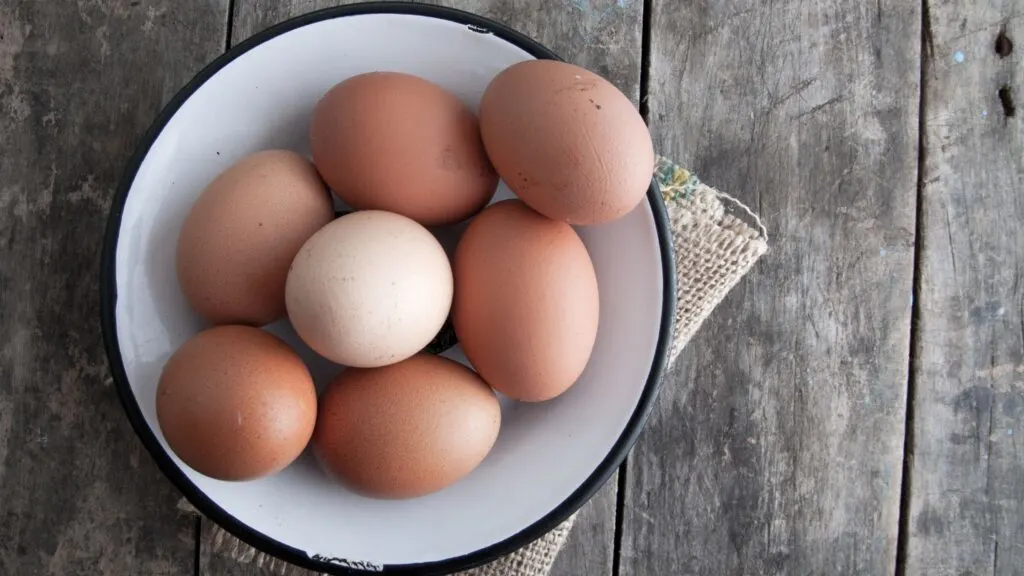
Duck Eggs Vs. Chicken Eggs
As far as eggs go, this one depends on the breed of chickens you raise and ducks. Certain breeds will lay more eggs for longer. In general, duck eggs are larger than chicken eggs. When raising backyard poultry for eggs, you will be waiting a while for fresh eggs.
If you want to eat duck eggs, it will be about 5- 6 months until ducks start to lay eggs. For chickens, you may be eating eggs a little sooner, sometimes around the 4-5 month mark.
Either way, raising chicks or ducklings for eggs is a long-term investment. If you wonder if raising your own eggs is cheaper than buying eggs, it’s not. Check out the cost breakdown here.
When we had our Khaki Campbells, the golden yolks tasted thicker than the white part on a chicken egg.
Some of the best laying duck breeds are the Khaki Campbells ( Sometimes we would get two eggs a day with this breed), Indiana Runners ( what we have now, but the ducks haven’t started laying eggs yet), Rouen, and Pekin to name a few.
You can’t go wrong with either ducks or chickens when it comes to getting eggs. Once you have fresh eggs daily, it will be painful to go back to store-bought eggs.
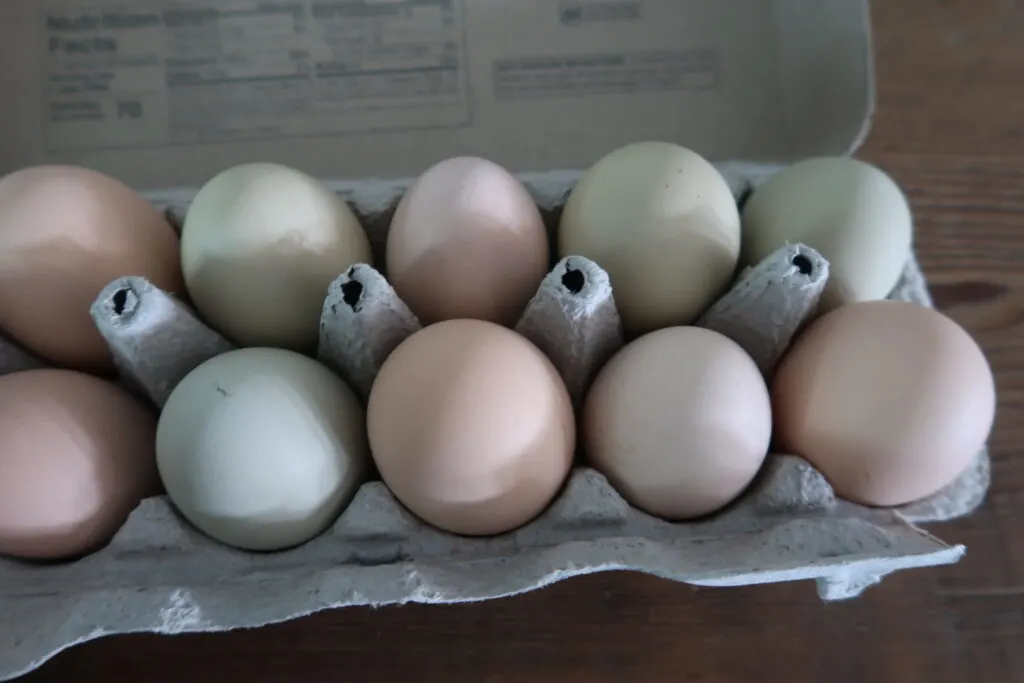
I’d rather raise chickens for eggs because they are easier to care for than ducks. I’m looking forward to fresh eggs from the Indiana Runners. This duck breed can lay white or blue/green eggs.
We have a few Easter Egger chickens who lay blue/green eggs, and I love the color variety they give our chicken eggs.
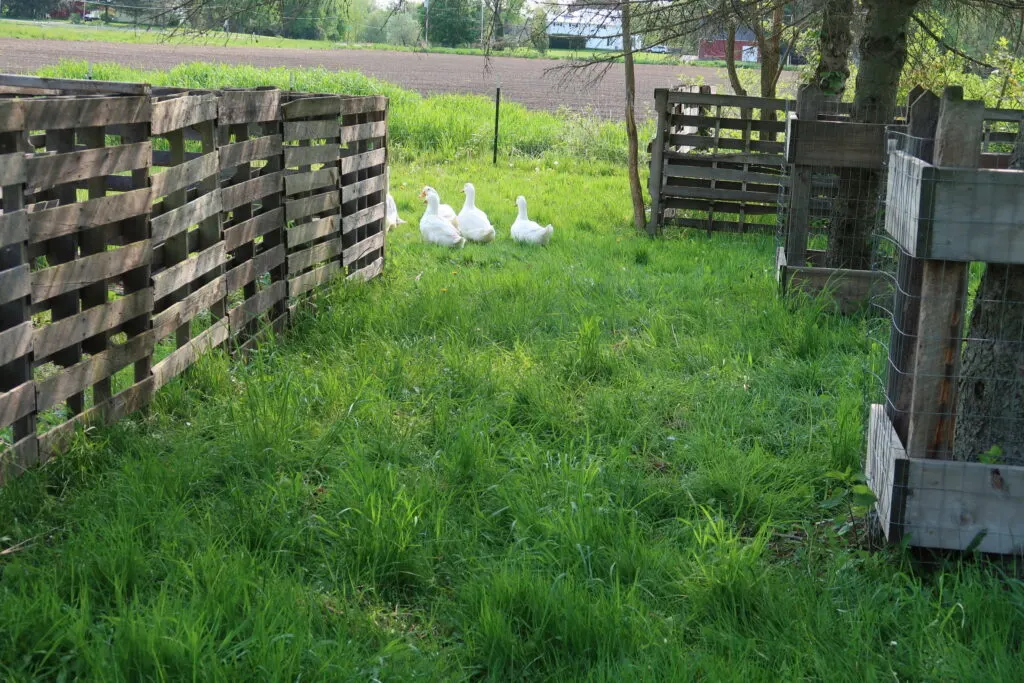
Space
is also a factor when it comes to fencing. Ducks need more space for their coop since they can fly and need room to roam. On the other hand, chickens don’t need as much space but should still have an area where they can explore and run around safely.
We are using pallets in this pen to protect the asparagus and strawberries. Also, for the protection of the pine trees, when we move the goats into this pen in the fall.
Ducks vs. Chickens: Environmental Factors
Seasonal Temperatures
Our ducks have always been able to handle the cold temperatures well. While some of our chickens were getting frostbite on their combs, the ducks were doing well.
Both will need shade to stay cool in the hot summer months. But overall, the temperatures shouldn’t determine your decision to raise ducks vs. chickens.
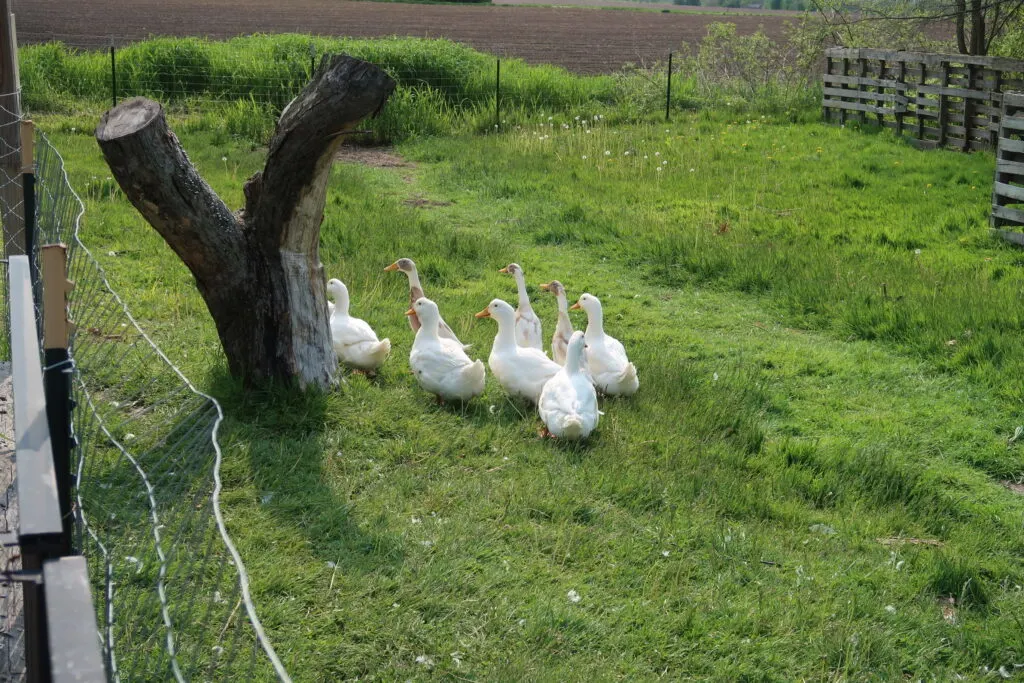
Ducks vs Chickens: Diet
The diet of ducks and chickens can vary, but overall, it’s important to ensure their nutritional needs are met.
Ducks forage just like chickens, and some breeds are better foragers than others. Most chicken breeds will forage in your yard. In the warmer months, I’ll only fill the feeder at night.
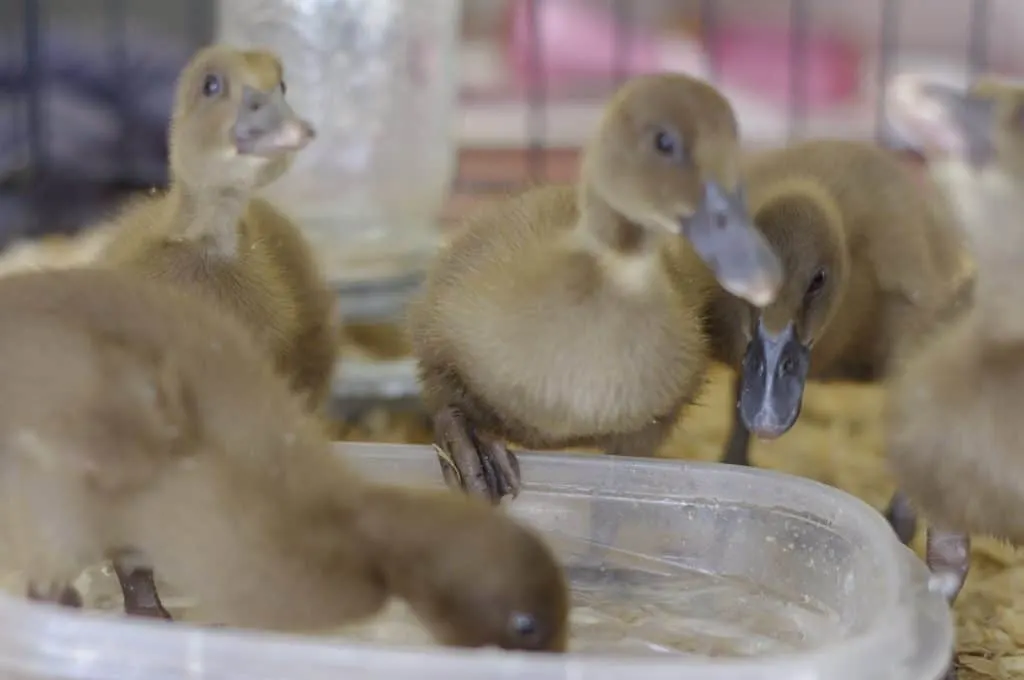
Ducks vs. Chickens: Water
Unlike chickens, ducks prefer access to a pond or other water source as they love swimming and paddling. On the other hand, chickens don’t require access to a large body of water but will drink from the pool the ducks use.
Some breeds of ducks will mate in the water. Of course, this will only happen if you have male ducks called drakes. Like chickens, you do not need a Drake or a Rooster( male chicken) to get eggs from your backyard poultry.
I recommend getting a drake if you want to incubate your duck eggs. I recommend getting a Rooster if you plan on free-ranging/pasture-raising your chickens and want to incubate your chicken eggs.
If you are going to keep domestic ducks, it’s best to invest in a small plastic baby pool for them; they are so much fun to watch swimming and dunking in the water.
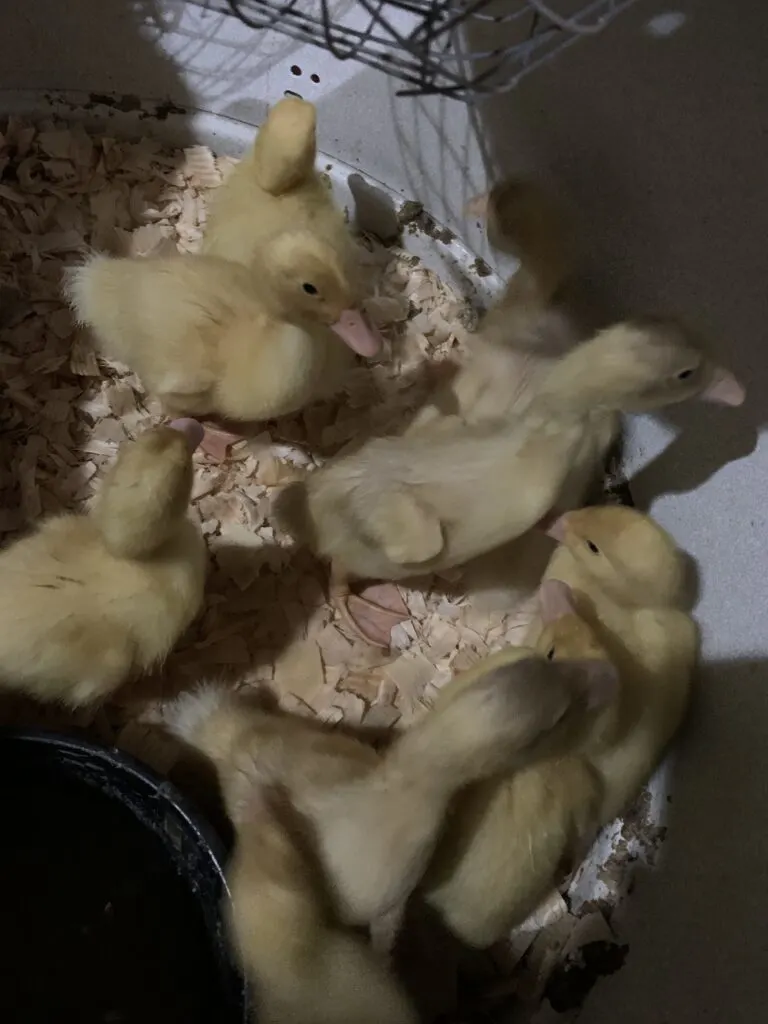
Ducks vs. Chickens: Health
Both ducks and chickens can be prone to various health concerns, including respiratory infections, coccidiosis, mites, lice, and more. It’s important to research the breed you are looking at before deciding.
In my Chicken Raising guide here, I mention how Rhode Island reds have amazing egg production but have always been the most prone to disease. You can check out the best-laying chicken breeds here.
Ducks vs Chickens: Availability
Both ducklings and chicks can be found at most feed stores, breeders, or online. Duck breeds tend to be more limited than chicken breeds, so you may have difficulty finding the exact duck breed you are looking for. When it comes to chickens, there is usually a much larger variety of breeds available.
I’ve been lucky and have gotten our ducks and chicks on clearance at Tractor Supply. We now have an incubator and used the HoovaBator incubator for our last couple of batches of chickens, and we highly recommend it.
In conclusion, both ducks and chickens can make great pets. They both have pros and cons, so it’s important to understand your goals, setup, and time commitment before deciding which is best for you.
If you go with chickens, get started with my Backyard Chicken Planner here.

Ducks need more space, noise, water requirements, and health care, but they are also very fun-loving animals that can provide countless hours of entertainment.
On the other hand, chickens require less space and maintenance but can still provide companionship. Ultimately, choosing backyard poultry that fits your lifestyle and needs is important.
With a little research, anyone can find the perfect pet for them—whether it’s a duck or a chicken!
